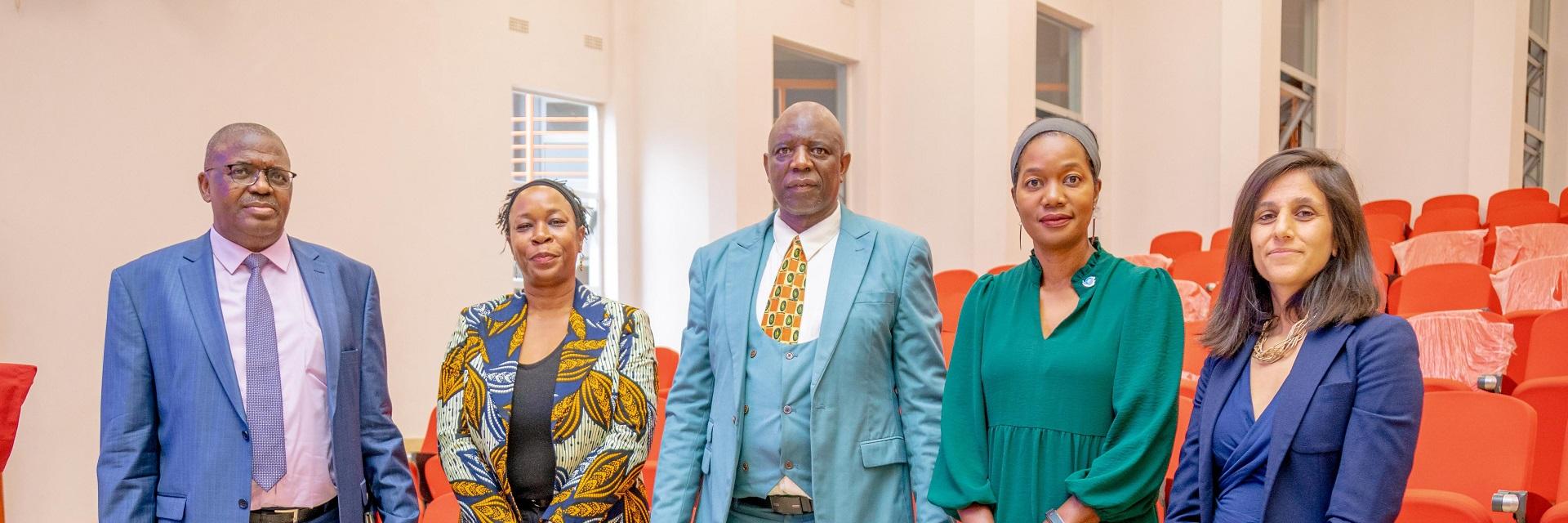Lusaka, Zambia, 9 June 2023 - The United Nations Economic Commission for Africa (UNECA) Sub regional Office for Southern Africa (SRO-SA), in collaboration with the University of Zambia (Department of Economics) and the International Monetary Fund (IMF) Office for Zambia, organised a public lecture under an initiative to promote engagements with stakeholders in Zambia on topical national development issues. This is the second in the series of public lectures with the student body, lecturers and national stakeholders. The first joint lecture with the University of Zambia was on debt management and was held in July 2022.
The lecture on, ‘Addressing the Financial Squeeze for Achieving Sustainable Development Goals (SDGs)’ aimed to raise awareness of the extent and impact of the financial squeeze in Sub Sahara Africa broadly and Zambia specifically and how this has constrained fiscal space for financing development. The lecture underlined the need for improved financial management, domestic resource mobilization, and strategic partnerships to achieve SDGs. It was delivered jointly by IMF Resident Representative, Ms Preya Sharma whose presentation entitled The Big Funding Squeeze elaborated on the extent and impact of the squeeze and ECA Chief of the Inclusive Industrialization Section, Ms. Olayinka Bandele whose presentation on “Financing SDGs in Zambia” interrogated the progress on SDGs and the underlying impediments to progress.
Ms. Sharma cited the challenges of persistent global inflation, tighter monetary policies and how higher borrowing costs and rising public debt burdens amplified the region's macroeconomic imbalances, interrupting economic recovery after the pandemic. She mentioned that, “lack of funding may force countries to reduce resources for critical development sectors and further weaken their growth potential. The funding squeeze may force countries to reduce resources for critical development sectors like health, education and infrastructure”.
Ms. Olayinka Bandele emphasized that to achieve SDGs in Zambia, it is imperative to address the funding gap through a combination of domestic resource mobilization, innovative financing mechanisms and enhanced private sector participation. She said, “Adequate financing plays a critical role in realizing SDGs. Without substantial financial support, these goals will remain elusive. It is essential to unlock finances for accelerated SDG implementation in Zambia. Facilitating partnerships, advocating for increased financial support for the SDGs and enhanced collaboration through a tripartite compact involving the Zambian government, development partners, and the private sector is essential to bridge the funding gap and accelerate progress towards the SDGs”.
She highlighted the importance of the inclusive industrialization pathway to sustainable job creation and poverty alleviation and emphasized that industrialization and regional value chains development provides routes towards addressing the challenges of unemployment, poverty and inequality. ECA’s support to the development of the Common Agro-industrial Park involving Zambia and Zimbabwe; and battery precursor project involving the Democratic Republic of Congo and Zambia, demonstrate support to the active involvement of the private sector in tangible development activities anchored on key sectors.
The highlight of the lecture was the Question-and-Answer Session moderated by Ms. Eunice Kamwendo, Director ECA SRO SA that gave an opportunity for the students and other participants to raise pertinent issues and provide more insights on the lecture theme. The
discussants, Mr. Bona Chita and Mr. Obrian Ndlovu, applauded the lecture, noted the challenges of resource mobilization, dis-aggregated data availability and called for more private sector development, especially in the resources sectors, as key in supporting socio-economic development. Through their interventions, the participants emphasized the need for Zambia to re-negotiate the terms of financing with partners where possible, move away from loans, identify their priorities and support to SDGs that are more relevant to local stakeholders and issues so that the country owns the economic agenda fully. Other issues raised by participants were on the need to lower inflation, active participation of Zambians citizens in policy choices by the government and a call on ECA and IMF to undertake direct activities in the field. Kamwendo appreciated the discussion and called on the participants to own the process of addressing the financial squeeze for achieving SDGs in Zambia noting critical need to address the high poverty and unemployment levels in the country.
Mr. Jacob Malungo, Dean, School of Humanities and Social Sciences, University of Zambia applauded the lecture initiative, observing the immense benefits for both lecturers and students from interaction with experts. He underscored the importance of the platform for sharing research findings from specialised agencies such as IMF and ECA and thus enriching dialogue and debate. On SDGs, he added that, “We need to implement SDGs through an 8th National Development Plan that interlinks with the whole society”.
The lecture was an opportunity to dialogue, collaborate and interrogate innovative solutions for overcoming the financial squeeze, leveraging the work of the IMF on the financing challenges in Sub-Sahara and that of ECA in supporting industrialization. It helped deepen stakeholders’ understanding of strategies for financing the implementation of the SDGs and the aspirations of the 8th National Development Plan.
Issued by:
Communications Section
Economic Commission for Africa
PO Box 3001
Addis Ababa
Ethiopia
Tel: +251 11 551 5826
E-mail: eca-info@un.org

